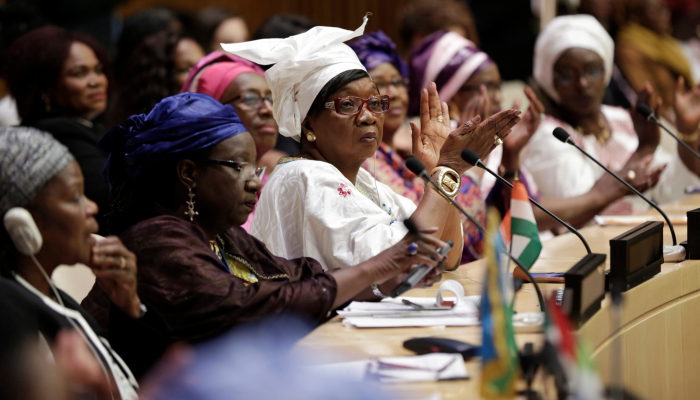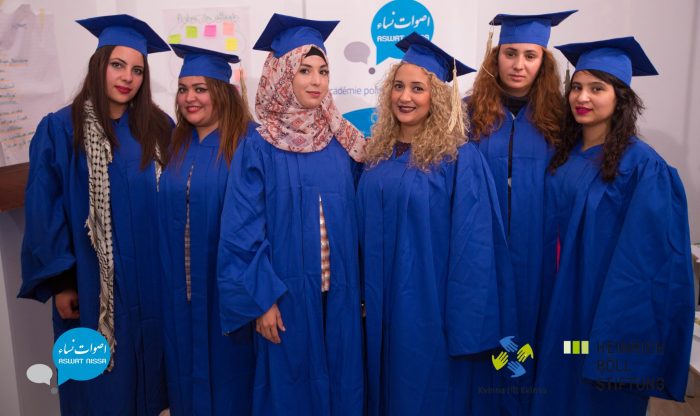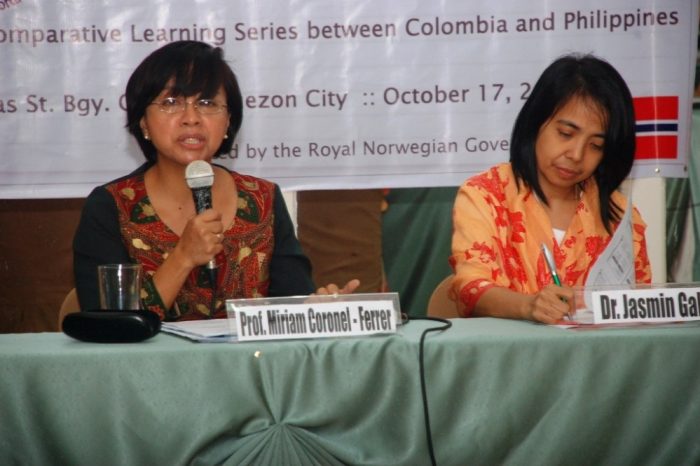Women play major roles as decision-makers and leaders, yet progress on women’s political representation has been slow across much of the world. Only 22 countries have women in the highest position of political power and only 25 percent of national parliamentarians are women. Getting women in top leadership positions is critical—but it is also not enough. Traditional gender roles, conscious and unconscious biases, and discriminatory attitudes and norms continue to pose barriers to women’s full and meaningful participation.
Here we highlight strategies and best practices for increasing women’s meaningful political participation from around the world, which include women’s quotas, gender caucuses, training and capacity building, and supporting women in leadership roles. The transition period from conflict to peace is also a key moment to enshrine principles of gender equality and set the conditions that continue to advance women’s political participation.
IMPLEMENTING SPECIAL MEASURES TO FACILITATE WOMEN’S MEANINGFUL PARTICIPATION IN POLITICS
Women’s visibility in positions of power and authority is key to changing local attitudes about their leadership. Pursuing special measures for gender inclusion, including quotas, reserved seats, and benchmarks, can help boost women’s meaningful representation in government and leadership roles.

“There’s disproportionate interest in women politician’s appearance and family structure… such stereotypes cannot persist if we drag them into the open and shine a light on them.” — Julia Gillard, Former Prime Minister of Australia
- Targeted, affirmative action programs can be powerful methods to break into male-dominated institutions of power. International IDEA’s Global Database of Gender Quotas tracks the use of quotas as a tool to increase the political participation and representation of women. Such affirmative action measures can ensure electoral commitments on gender equality and internal party structures.
- Almost two-thirds of countries have constitutional or other legal provisions—such as quotas, reserved seats, and benchmarks— to promote women’s political participation. Quotas are most effective when they include sanctions for noncompliance as well as a numerical target, and they should be tailored to the country context. In Bolivia, women hold 53 percent of the seats in the Bolivian Chamber of Deputies and 47 percent of the seats in the upper house thanks to voluntary party quotas and legislated quotas at various levels of government and sanctions for non-compliance. In Australia’s National Parliament, targets at the entry-level resulted in the Labor Party hovering near gender parity in representation.
- In Afghanistan, the National Solidarity Program’s requirement of gender-balanced community development councils changed attitudes about women in leadership positions, resulting in a 22 percent increase in acceptance of women’s membership in village councils. Women’s inclusion in these councils also led to increases in girls’ school attendance and women’s mobility across villages.
BUILDING A PIPELINE OF WOMEN LEADERS AND SUSTAINING SUPPORT FOR GENDER EQUALITY
Providing mentorship and skill-building opportunities for women to run for office, build subject-matter expertise, and assert political authority can help build capacities and change attitudes about women’s leadership.

“It was very important that we were inclusive because we were building our democracy, and we wanted all women, all voices to be represented in the Parliament and in the political sphere. One of the reasons we engaged with the Islamist party is because they were the winning party, and if we are serious about channeling our demands and achieving systemic change we need to engage with that power.” — Ikram Ben Said, Founder, Aswat Nissa, Tunisia
“If we don’t invest in efforts to transform the internal party processes, we will always find that women will be marginalized and underrepresented in all positions of power and decision-making, because gender equality is not going to happen by some evolutionary miracle.” — Rumbidzai Kandawasvika-Nhundu, Senior Advisor for Democracy and Inclusion, International IDEA
- The Tunisian organization Aswat Nissa, led by Ikram Ben Said, trains female candidates to run for elected office and organizes countrywide programs encouraging women to vote. One participant of Aswat Nissa, Ichrak Rhouma, was voted onto the Council of Sidi Hassine in Tunis. She has attributed her deeper knowledge of women’s rights and topics such as gender-sensitive budgeting to Aswat Nissa. Political organizing efforts by women’s groups and decentralization reforms requiring horizontal and vertical gender parity brought women’s participation in Tunisia’s 2018 municipal elections close to parity.
Gender-targeted public funding for political parties can overcome the financial obstacles that pose a barrier to women’s equal representation. Gender-sensitive budgeting is also critical for sustained support to the gender equality agenda by allocating resources to the specific needs and priorities of women.
- Investing in sustained interventions to transform political parties starts with internal documents, rules, and regulations. Political parties can mainstream gender within their internal systems by developing gender-sensitive policy frameworks,backed by financial support; ensuring inclusive, gender-balanced candidate recruitment; and supporting women in their campaigns from the start.
Creating gender caucuses can sustain support for women’s active participation in politics, peace, and security processes by highlighting their voices and contributions in a meaningful way.
- The bipartisan Women, Peace and Security (WPS) Congressional Caucus in the United States and the Equal Opportunities Caucus in Ukraine seek to ensure that the WPS goals, including advancing women’s meaningful political participation, are considered national security and foreign policy priorities.
- Mauritius, the highest ranking Sub-Saharan African country on the Women, Peace, and Security Index, launched a Parliamentary Gender Caucus in 2017 and established 48 Gender Focal Points in all ministries. The caucus also held workshops with counterparts in Rwanda and Uganda to share examples of best practice.
Women-led social movements, civil society organizations, and political leaders can help build strong institutions and foster accountability and transparency, including in places where democracy has been repressed and during transitions following violent conflict or crisis.
-
- As head of the Anticorruption Office and a former Member of Congress in Argentina, Laura Alonso worked to ensure good governance, transparency, and anti-corruption policies had a gender perspective.
- During the 2019 revolution in Sudan that ousted President Omar al-Bashir, women of all ages and backgrounds demonstrated for accountability, justice, and regime change against al-Bashir’s nearly 30-year rule. Women—like Alaa Salah, who led a crowd of protesters in singing— were at the frontline of the revolution and demonstrated not only for political change but also against patriarchy in both the public and private spheres. Women’s groups also launched “The time has come” campaign to denounce sexism and al-Bashir’s Public Order law that regulated what women could wear, whom they spoke to, and what job they could hold.
CAPITALIZING ON THE POST-CONFLICT MOMENT TO ADVANCE EQUALITY
The transition period from conflict to peace is also a key window of opportunity to advance women’s political participation and gender equality, which also makes peace more sustainable.

“Open governments and liberal democracies are the systems that make women progress, and when women progress, all society progresses.”
— Laura Alonso, Former Head of the Argentina Anti-Corruption Office
To capitalize on this moment, ensuring women’s meaningful participation in official peace negotiations (Track I) to informal peacebuilding initiatives (Track II) is key. Supporting women at all stages of peace processes is critical for building local trust in formal political processes and providing information and technical expertise to political leaders, who are well-positioned to advocate for women’s issues. The peace processes in Colombia, the Philippines, and South Sudan are three promising examples:
- In the Colombian process leading to the 2016 peace agreement, the Gender Sub-Commission of Negotiating Parties included women and incorporated a gender perspective in peace negotiations. The sub-commission played a critical role in engaging women’s civil society organizations and in adopting 130 gender-related commitments in the peace accord. Women’s groups also built public support for the peace talks and worked with women negotiators to incorporate gender issues into the agenda, such as land rights for indigenous women and reparations for victims of sexual and gender-based violence.
- In the Philippines peace process in 2014, which brought an end to decades of civil strife in Mindanao, women participated in both the formal and informal negotiations. Miriam Coronel Ferrer, the first female chief peace negotiator, channeled women’s grassroots voices into the formal peace talks. Women’s groups also successfully advocated for the adoption of gender provisions in the peace agreement and the establishment of a Civilian Protection Component with 70 percent female membership that monitored the ceasefire and worked to protect civilian communities.
- In South Sudan, the Women’s Coalition—comprising 44 women’s groups— provided technical support for female participants in the formal peace talks in 2018 and helped to successfully negotiate a 35 percent quota for women in executive bodies.